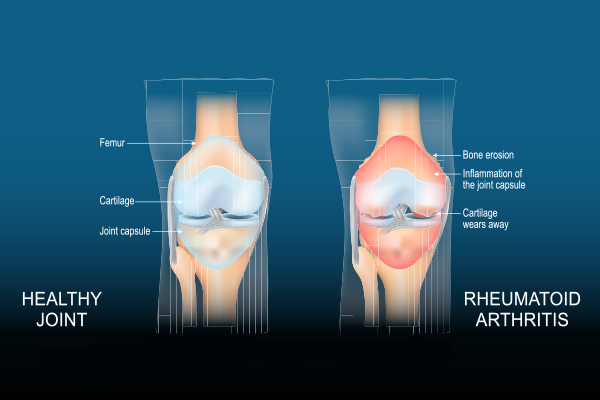
Rheumatoid arthritis (RA) is a chronic autoimmune disease that primarily affects the joints, causing pain, swelling, and stiffness. It occurs when the immune system mistakenly attacks the synovium, the lining of the membranes surrounding the joints. This leads to inflammation and, over time, joint damage. Without proper management, rheumatoid arthritis can significantly impact mobility and overall quality of life. RA is a progressive condition, meaning that symptoms worsen over time. It not only affects the joints but can also cause complications in other parts of the body, including the heart, lungs, and eyes. Early diagnosis and treatment are crucial in slowing disease progression and maintaining function.
Synopsis
Causes of Rheumatoid Arthritis
While the exact cause of rheumatoid arthritis remains unknown, several risk factors contribute to the disease:
-
Genetic Factors: A family history of rheumatoid arthritis increases susceptibility.
-
Immune System Dysfunction: The immune system mistakenly attacks the body's tissues, leading to chronic inflammation.
-
Environmental Triggers: Exposure to pollution, smoking, and infections may contribute to RA development.
-
Hormonal Changes: Women are more prone to RA, potentially due to hormonal fluctuations.
-
Obesity and Lifestyle Factors: Excess weight adds stress to the joints, exacerbating symptoms.
Common Symptoms of Rheumatoid Arthritis
The symptoms of RA vary in severity and often fluctuate between flare-ups and periods of remission. Common symptoms include:
-
Persistent Joint Pain and Tenderness: RA typically affects the small joints of the hands and feet first.
-
Morning Stiffness: Stiffness lasting longer than an hour is a hallmark symptom.
-
Swollen, Warm, and Red Joints: Inflammation causes visible and painful swelling.
-
Fatigue, Fever, and Loss of Appetite: Systemic inflammation leads to persistent tiredness and weight loss.
-
Symmetrical Joint Involvement: RA affects both sides of the body equally.
-
Rheumatoid Nodules: Small, firm lumps under the skin, often near pressure points.
Rheumatoid Arthritis Treatments
Although there is no cure for rheumatoid arthritis, various treatments help manage symptoms and improve quality of life. The primary goals of treatment are to reduce inflammation, relieve pain, and prevent joint damage.
1. Medications for Rheumatoid Arthritis
RA treatment typically involves a combination of medications tailored to each patient.
|
Medication Type |
Examples |
Purpose |
|
NSAIDs (Nonsteroidal Anti-inflammatory Drugs) |
Ibuprofen, Naproxen |
Reduces pain and inflammation |
|
Corticosteroids |
Prednisone |
Provides quick relief from inflammation |
|
DMARDs (Disease-modifying Antirheumatic Drugs) |
Methotrexate, Leflunomide |
Slows disease progression |
|
Biologic Response Modifiers |
Adalimumab, Infliximab |
Targets specific parts of the immune system |
|
JAK Inhibitors |
Tofacitinib, Baricitinib |
Reduces immune response activation |
2. Lifestyle Modifications
Simple lifestyle adjustments can significantly improve RA symptoms:
-
Regular Exercise: Low-impact activities like swimming, yoga, and stretching help maintain flexibility.
-
Healthy Diet: Anti-inflammatory foods such as fish, nuts, and leafy greens reduce flare-ups.
-
Stress Management: Meditation, deep breathing exercises, and relaxation techniques can help ease symptoms.
-
Weight Management: Maintaining a healthy weight reduces strain on affected joints.
3. Physical Therapy
A physical therapist can develop a customised exercise plan to:
-
Improve joint mobility
-
Strengthen surrounding muscles
-
Reduce pain and stiffness
-
Enhance overall functionality
4. Assistive Devices and Alternative Therapies
Assistive devices like braces, splints, and ergonomic tools help ease daily activities. Additionally, complementary therapies such as acupuncture, massage, and hot/cold therapy provide symptom relief for some patients.
5. Surgical Options for Severe Cases
When RA leads to significant joint damage, surgery may be necessary:
-
Joint Replacement (Arthroplasty): Replacing damaged joints with prosthetic ones.
-
Synovectomy: Removing inflamed synovial tissue to reduce pain and swelling.
-
Tendon Repair: Correcting damaged tendons caused by chronic inflammation.
The Importance of Early Diagnosis
Early diagnosis plays a crucial role in managing rheumatoid arthritis effectively. Seeking medical attention at the first signs of persistent joint pain and stiffness can lead to a more favourable prognosis. Timely intervention with appropriate medications and lifestyle adjustments can slow disease progression and help maintain mobility.

Managing Rheumatoid Arthritis at Every Stage
While RA is a progressive disease, early diagnosis and proper treatment can slow its progression and improve quality of life. Here’s how:
-
Early Stage: Lifestyle changes, NSAIDs, and DMARDs.
-
Moderate Stage: Physical therapy, biologic drugs, and pain management.
-
Severe Stage: Assistive devices, occupational therapy, and surgery if needed.
-
End Stage: Pain relief, joint replacement, and palliative care.
If you or a loved one is experiencing symptoms of rheumatoid arthritis, consult a rheumatologist for early intervention. Timely treatment can help maintain mobility and prevent long-term complications.
Conclusion
If you or a loved one is experiencing rheumatoid arthritis symptoms, it is essential to consult a specialist for personalised treatment. At Manipal Hospital Baner, expert rheumatologists provide comprehensive care, including advanced treatments, rehabilitation programmes, and patient support. Book an appointment today to take the first step towards managing rheumatoid arthritis effectively!
FAQ's
No, but early diagnosis and appropriate treatments can help manage symptoms and prevent joint damage.
Common early symptoms include joint pain, stiffness (especially in the morning), swelling, and fatigue.
Doctors use a combination of:
-
Blood tests (e.g., Rheumatoid Factor, Anti-CCP Antibodies)
-
Imaging (X-rays, MRI, Ultrasound)
-
Physical examination
Yes, genetics plays a role, but environmental factors and lifestyle choices also influence the risk.
Avoid processed foods, excessive sugar, red meat, and dairy, as they may trigger inflammation.






















 4 Min Read
4 Min Read















